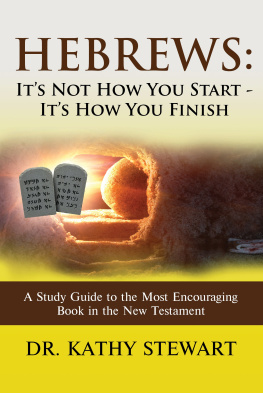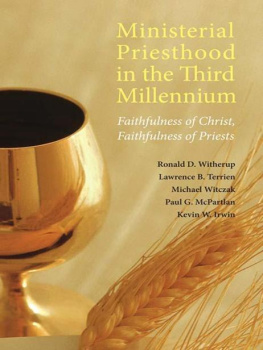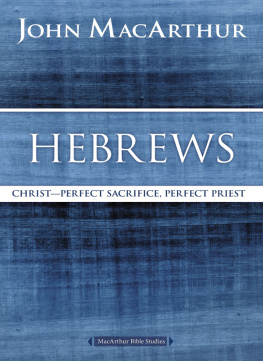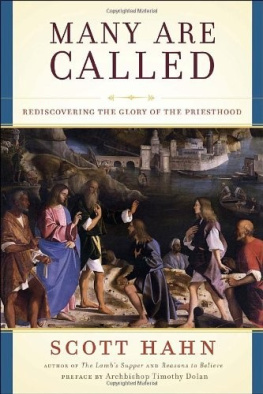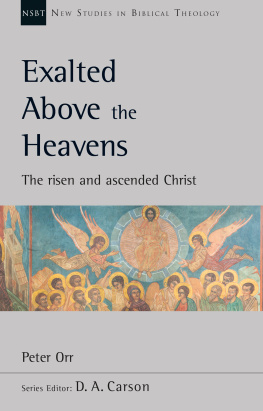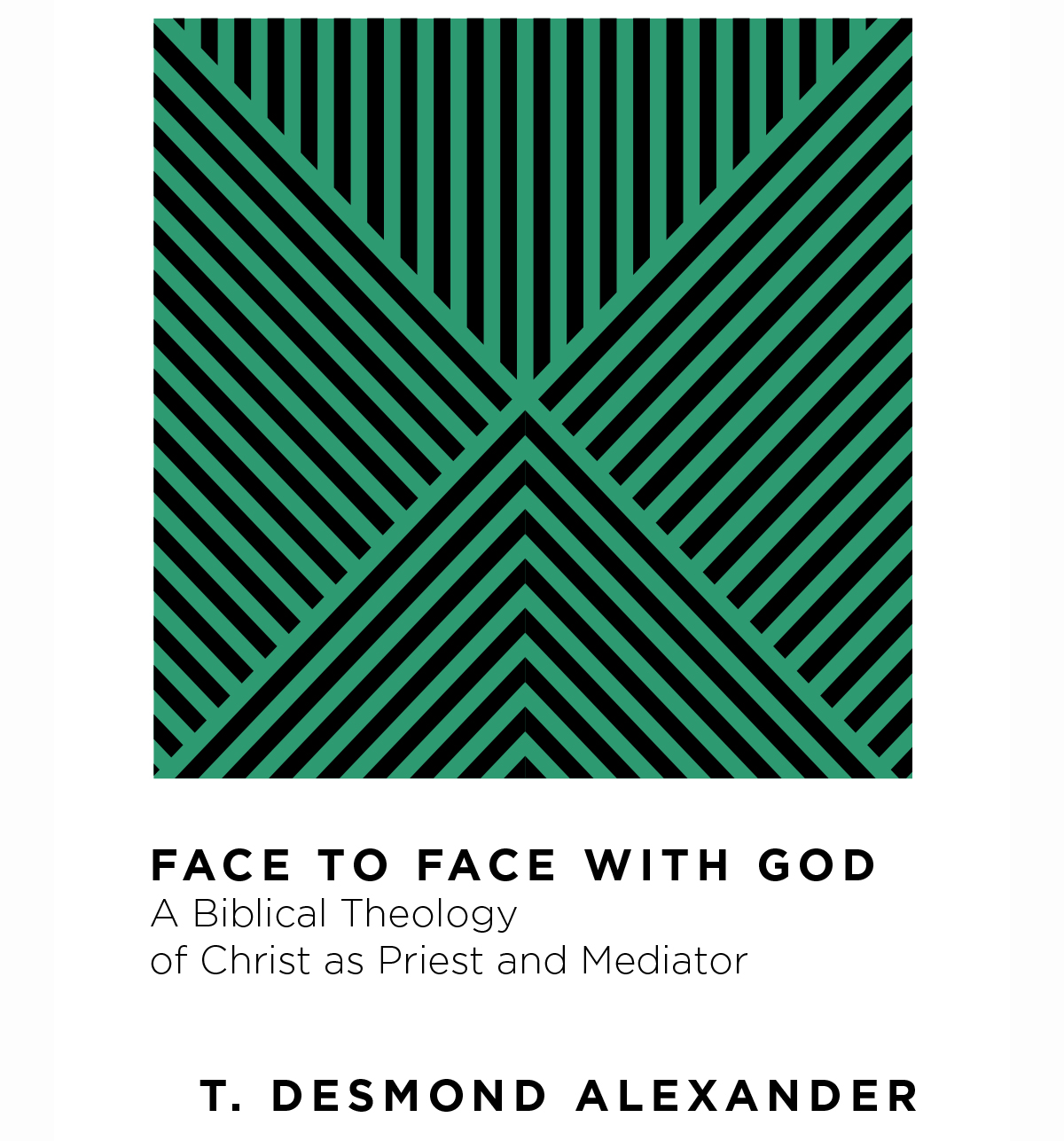Sommaire
Pagination de ldition papier
Guide
InterVarsity Press
P.O. Box 1400, Downers Grove, IL 60515-1426
ivpress.com
2022 by T. Desmond Alexander
All rights reserved. No part of this book may be reproduced in any form without written permission from InterVarsity Press.
InterVarsity Press is the book-publishing division of InterVarsity Christian Fellowship/USA, a movement of students and faculty active on campus at hundreds of universities, colleges, and schools of nursing in the United States of America, and a member movement of the International Fellowship of Evangelical Students. For information about local and regional activities, visit intervarsity.org.
All Scripture quotations, unless otherwise indicated, are taken from The Holy Bible, New International Version, NIV . Copyright 1973, 1978, 1984, 2011 by Biblica, Inc. Used by permission of Zondervan. All rights reserved worldwide. www.zondervan.com. The NIV and New International Version are trademarks registered in the United States Patent and Trademark Office by Biblica, Inc.
The publisher cannot verify the accuracy or functionality of website URLs used in this book beyond the date of publication.
Cover design and image composite: David Fassett
Image: geometric patterns ExpressIPhoto / iStock / Getty Images Plus
ISBN 978-0-8308-4296-4 (digital)
ISBN 978-0-8308-4295-7 (print)
This digital document has been produced by Nord Compo.
For
Alan and Sheena Gaston
and
Tony and Valerie McGall
Series Preface
Benjamin L. Gladd
THE ESSENTIAL STUDIES IN BIBLICAL THEOLOGY is patterned after the highly esteemed series New Studies in Biblical Theology, edited by D. A. Carson. Like the NSBT, this series is devoted to unpacking the various strands of biblical theology. The field of biblical theology has grown exponentially in recent years, showing no sign of abating. At the heart of biblical theology is the unfolding nature of Gods plan of redemption as set forth in the Bible.
With an influx of so many books on biblical theology, why generate yet another series? A few reasons. The ESBT is dedicated to the fundamental or essential broad themes of the grand story line of the Bible. Stated succinctly, the goal of the ESBT series is to explore the central biblical-theological themes of the Bible. Several existing series on biblical theology are generally openended, whereas the ESBT will be limited to ten or so volumes. By restricting the entire series, the scope of the project is established from the beginning. The ESBT project functions as a whole in that each theme is intentional, and each volume does not stand solely on its own merits. The individual volumes interlock with one another and, taken together, form a complete and cohesive unit.
Another unique dimension of the series is a robust emphasis on biblical theology, spanning the entire sweep of the history of redemption. Each volume traces a particular theme throughout the Bible, from Genesis 13 to Revelation 2122, and is organically connected to the person of Christ and the church in the New Testament. To avoid a flat biblical theology, these projects are mindful of how the New Testament develops their topic in fresh or unexpected ways. For example, the New Testament sheds new light on the nature of the kingdom and messiah. Though these twin themes are rooted and explored in the Old Testament, both flow through the person of Christ in unique ways. Biblical theology should include how Old Testament themes are held in continuity and discontinuity with the New Testament.
The audience of the series includes beginning students of theology, church leaders, and laypeople. The ESBT is intended to be an accessible introduction to core biblical-theological themes of the Bible. This series is not designed to overturn every biblical-theological rock and investigate the finer details of biblical passages. Each volume is intentionally brief, serving as a primer of sorts that introduces the reader to a particular theme. These works also attempt to apply their respective biblical-theological themes to Christian living, ministry, and worldview. Good biblical theology warms the heart and motivates us to grow in our knowledge and adoration of the triune God.
Preface
I AM DEEPLY GRATEFUL to Ben Gladd for inviting me to contribute to this series, Essential Studies in Biblical Theology, that explores major themes vital to understanding the Bible better. At the time of invitation my grasp of the topic priest and mediator left much to be desired. So I ventured down a new path, not quite knowing what would await me, but quietly confident that I would not be disappointed. The study of the Bible rarely leads to a cul-de-sac. Through experience I have discovered that less traveled paths offer unexpected vistas that make the journey rewarding. As I initially surveyed the terrain, I quickly realized that others have been here before and have mapped out sections of the journey. My indebtedness to them is reflected in the footnotes and bibliography that accompany the main text. Hopefully, as you walk the path that I have taken, you too will come to gaze in wonder as our journey takes us to the heavenly throne of grace where Jesus Christ is seated in the presence of God the Father. Our way to this majestic and sacred location is revealed through the unique Scriptures shaped by the Holy Spirit. It is my prayer that this same Spirit will shed fresh light on these ancient texts as together we reflect on their relevance for our lives today.
The initial steps toward writing this book began during a period of study leave in the second half of 2019. I am most grateful to the members of the Management Committee of Union Theological College for granting me time to concentrate on research and writing. Not only do I wish to acknowledge the committees generous support, but I am indebted to three excellent part-time colleagues who stepped in to undertake additional teaching during my absence. My heartfelt thanks go to Drs. Paul Bailie, Colin Burcombe, and James McKeown.
Some of this book was written during a period of self-isolation due to Covid-19. While access to research resources was limited, I was able to borrow items from the Gamble Library at Union Theological College. For all that they do quietly and efficiently in the background to resource students and staff, I am most grateful to Joy Conkey and Margaret Ollivier. Without their assistance, this book would never have been written.
For transforming a rough manuscript into a book, I am indebted to Ben Gladd for his insightful editorial feedback. My thanks also goes to the staff of IVP for all that they have done in getting this book into print. Shortcomings that remain are entirely my responsibility.
A constant and supportive companion in my literary journeys has been my wife, Anne. While writing is predominantly a solitary activity, her presence is a vital reminder that life is more than books and journal articles. Sharing a now empty nest, we enjoy watching our children, Jane and David, create their own paths in companionship with their spouses, Ross and Alana. For all their love to us we are most grateful.





